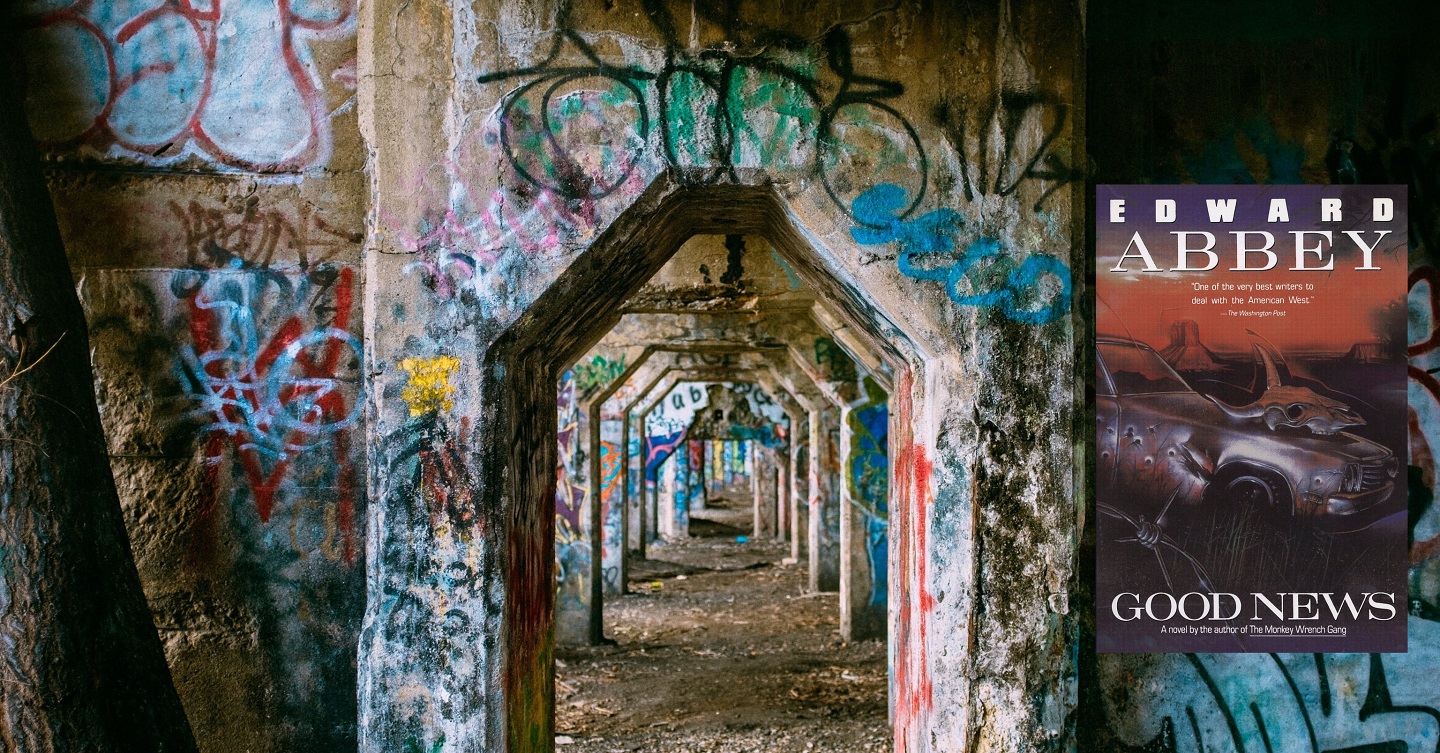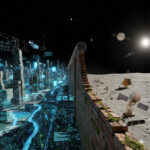
“This is the story: about forty years before the events of the novel, industrial society collapsed.”
Edward Abbey is an iconic, controversial figure among American environmentalists. The ideas in his writings, spanning from the mid-1950’s until his death in 1989, have been used, and abused, by radical elements across the political spectrum. He didn’t set out to be a leader or figurehead. Abbey simply wanted to be a novelist – and early in his literary journey to create one fat great American novel – but 33 years after his death, he is best known for his essays and articles on the wonders of the American Southwest and the need to preserve them, and for one of his several novels, the Earth First-inspiring Monkey Wrench Gang. It features a small group of environment activists lead by a former Green Beret medic damaging projects, without hurting people, which are damaging their Colorado Plateau. As it predicted, and inspired, similar acts of terrorism or protection, depending on one’s point of view, Monkey Wrench Gang may be as close as he got to that Great American Novel he sought (even if his Brave Cowboy was made into Kurt Douglas’ favorite movie).
Edward Abbey’s lone science fiction book, despite not having the cult following of Gang and being far from a perfect novel, proves more than 40 years after its publication that its extrapolations on America’s political, social, and environmental challenges are prescient and universal – if stylized and caricatured in places – have at least as much to offer as his other novels, particularly for the national security scholar. Good News, first published in 1980, describes a world 40 years after – as mentioned above – a general collapse of civilization caused by a combination of limited nuclear war, environmental degradation, resource overconsumption, and a localized conflict over pretenders to fill the resulting power vacuum. The Good News for War Room readers is the book’s scenario and exploration of how small-“p” political actors – make that humans – might operate, or just get by, in this environment, when things have fallen apart, a degraded urban society that may not look dissimilar enough for comfort to what many Americans saw during the early 2020s, and what occupants of many developing-nation megacities and urban conflict zones have been living with for decades.
Good News takes place in the American Southwest – both pre- and post-industrialization a ripe literary landscape for violent anarchism and societal collapse – mostly in the ruins of Phoenix, Arizona. The opening four pages set the scene: “There was … in those fading years of the doomed [20th] century, a sense of the overwhelming illusion in the minds of men and women. The cities became unreal. Not so much unbearable as unreal…a nightmare of dreariness…” their streets filled with “endless hordes of silent humans, most of them wearing air filtering masks.” Increasing corporatization and pollution of urban areas in the U.S. and elsewhere furthered individual isolation and anxiety, which work their way into international relations, “…so each nation strove to ensure its survival at the expense of all others.” An unspecified event in an unspecified Middle Eastern country led to war, “limited in scale but never ceasing.” Some nuclear weapons were used in “local and regional strife…a practical application of means always available.” Resource extraction intensifies, cities are unable to feed themselves leading to de-urbanization. Survivors resort to, or maintain, pastoral and rural ways in benign anarchy. In time, elements of the former state military and police apparatus, with recruits and conscripts, look to take the abandoned cities, and attempt to resurrect their imagined former greater. These actors in this scenario are the catalyst for a resumption of “…the oldest civil war of all, that between the city and the country…”
Good News is not a perfect work of literature, a tactics manual, or a primer on strategy: it’s an adventure story set in an operating environment which, although unevenly distributed, is here already, particularly in the Southwest.
Abbey’s particular dystopia and conflict scenario ran counter to the conventional conflict worries of the time: it explored something less dramatic and decisive than a full-scale nuclear exchange between the U.S. and Soviet Union, but not, in the end, something much better for those left alive. As state, and complex society, broke down more with whimper than boom from a series of wicked problems impacting fragile institutions in ways those institutions could no longer deal with, individuals are left to make choices to maintain dignity, purpose, independence, control, or just survive. They must revert and adjust when most of the technology on which they’ve relied no longer works (although small-scale magic makes a comeback, and as in so much twentieth century science fiction, cigarettes still manage to be manufactured). The plot follows a group of good guys, as it were – a mix of idealistic college students and professors who espouse some form of “anarchy” and other survivors, such as the book’s anti-establishment cowboy hero resurrected from The Brave Cowboy, who wants to more to be left alone – united in opposition to the private-military/fascists/nationalist “return to pre-collapse, but better” aspiring junta which seeks control over the cities (beginning with Phoenix) and, eventually, the whole of what was the United States.
Good News is not a perfect work of literature, a tactics manual, or a primer on strategy: it’s an adventure story set in an operating environment which, although unevenly distributed, is here already, particularly in the Southwest. The region is undergoing water and climate crises, and the wearing of air filter masks is common – and often mandatory – for both air pollution and disease protection in Phoenix and elsewhere. In the Middle East, wars “limited in scale but never ceasing” continue, and provoke isolation and anxiety well beyond their causes and borders. And the “oldest civil war” Abbey refers to is the type mentioned in much of the current speculation as to whether or not one is coming: on the far extremes of the political spectrum, groups identifying as anarchists and nationalist (fascists to some) do fight, in relatively small groups, for vague objectives in mostly- depopulated urban streets.
Abbey clearly sides with the pastoral anarchists over the fascists, but he had served as a U.S. Army MP in the last days of World War II, in occupied Italy, and as a National Park Ranger, and thus had law enforcement experience in both post-conflict societies and wilderness environments during times of accelerated change. Perhaps that combination explains why, for a self-described pacifist, his books Good News, Monkey Wrench Gang, and Brave Cowboy all revolve around forms of irregular warfare, and why, for a self-described Luddite, his writings are so often future-focused and prophetic.
In 1980 and 2022, preparations for future military operating environments assumed the possibility, and desirability, of increasingly complex technology. The battlefield may be a ruined city or radiated plain, but better technology would be available and provide a decisive capability for whichever side possessed it. In Abbey’s future, however, technological complexity caused its own collapse, and military power is localized and used for dubious objectives. Since at least the novel’s writing, developed nations’ militaries have suffered increasing checks – if not outright defeats – by less-developed technologies, from non-military actors, and from their own inability to maintain existing technology. And the Coming Anarchy predicted in the 1990s has arrived: even if the anarchists of the book and the ongoing urban protests weren’t exactly victorious, a general fog of anarchy permeated Abbey’s world of the early 2020s in ways not always so far removed from many of today’s landscapes, both foreign and domestic.
That prescience is reason enough for the modern national security practitioner to find a copy of Good News and, like a pastoral nomad passing through a ruined city – or something less severe– glean some insights and predictions from its pages.
J. Overton is the editor of Seapower by Other Means: Naval Contributions to National Objectives Beyond Sea Control, Power Projection, and Traditional Service Missions, and a former Non-Resident Fellow with the Modern War Institute at West Point.
The views expressed in this article are those of the author and do not necessarily reflect those of the U.S. Army War College, the U.S. Army, U.S. Navy, U.S. Marines Corps, U.S. Coast Guard or the Department of Defense.
Photo Credit: pxfuel





From the Denver Post item “Edward Abbey’s ‘Desert Solitaire’ More Relevant Than Ever” by John Buckley/Writers on the Range, January 12, 2018:
“Compared to Abbey’s fierce opposition to modern capitalism, Sen. Bernie Sanders comes off as comparatively milquetoast. Above all, Abbey was an opponent of ‘that cloud on my horizon’ he defined as progress. This wasn’t Luddism so much as a deep need to preserve a small portion of America as wilderness, kept forever free from development, beginning with precisely those areas of southern Utah attacked by Trump and Zinke.”
Given this analysis of Abbey’s thoughts — on such things as capitalism, progress and development — what do we think that Abbey would have thought of such things as:
a. The United States foreign internal defense and internal defense and development programs:
“a. An IDAD (Internal Defense and Development) program integrates security force and civilian actions into a coherent, comprehensive effort. Security force actions provide a level of internal security that permits and supports growth through balanced development. This development requires change to meet the needs of vulnerable groups of people. This change may, in tern, promote unrest in the society. The strategy, therefore, includes measures to maintain conditions under which orderly development can take place.” (Item in parenthesis here is mine.) And such things as:
b. The United Nations Millennium Development Goals (MDGs)?:
“The eight Millennium Development Goals (MDGs) – which range from halving extreme poverty rates to halting the spread of HIV/AIDS and providing universal primary education, all by the target date of 2015 – form a blueprint agreed to by all the world’s countries and all the world’s leading development institutions. They have galvanized unprecedented efforts to meet the needs of the world’s poorest. The UN is also working with governments, civil society and other partners to build on the momentum generated by the MDGs and carry on with an ambitious post-2015 development agenda.”
https://www.un.org/millenniumgoals/
As we know, such things as capitalism, progress and development, these have a “cost,” for example, as described here:
“All in all, the 1980s and 1990s were a Hayekian moment, when his once untimely liberalism came to be seen as timely. The intensification of market competition, internally and within each nation, created a more innovative and dynamic brand of capitalism. That in turn gave rise to a new chorus of laments that, as we have seen, have recurred since the eighteenth century: Community was breaking down; traditional ways of life were being destroyed; identities were thrown into question; solidarity was being undermined; egoism unleashed; wealth made conspicuous amid new inequality; philistinism was triumphant.”
(From the book “The Mind and the Market: Capitalism in Western Thought;” therein, see the chapter on Friedrich Hayek.)
“Capitalism is the most successful wealth-creating economic system that the world has ever known; no other system, as the distinguished economist Joseph Schumpeter pointed out, has benefited ‘the common people’ as much. Capitalism, he observed, creates wealth through advancing continuously to every higher levels of productivity and technological sophistication; this process requires that the ‘old’ be destroyed before the ‘new’ can take over. … This process of ‘creative destruction,’ to use Schumpeter’s term, produces many winners but also many losers, at least in the short term, and poses a serious threat to traditional social values, beliefs, and institutions.”
(From the book “The Challenge of the Global Capitalism: The World Economy in the 21st Century,” by Robert Gilpin; therein, see the very first page, of the very first chapter [the Introduction chapter].)
Abbey, having died in 1989, did not live to see the post-Cold War world.
I wonder what he would have thought of the unleashing of such things as capitalism, globalization and the global economy during this time; these, in the name of such things as development and progress?
Where can I find Edward Abby’s books to read?